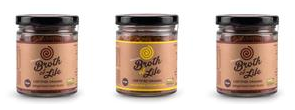
Written by David Perlmutter MD.
I speak often about the benefits of making bone broth a dietary staple because it is tied to some really terrific health benefits that are well supported by scientific literature. In particular, bone broth is a fantastic source of important nutrients like collagen, glycosaminoglycans, proline, glutamine, and glycine. But why are these nutrients so important for our health?
Collagen
Collagen is one of the most important types of protein in the human body because it is the fundamental component of various connective tissues including cartilage, ligaments, tendons, and even our skin. This makes it a powerful nutrient for skin conditions and joint pain. In fact, an interventional study dating all the way back to 1993 looked at patients with severe, active rheumatoid arthritis. The subjects that were fed collagen for 3 months had a decreased number of swollen joints, with 4 patients going into complete remission.
Glycosaminoglycans
Glycosaminoglycans (GAGs) are really important for skin health because they support collagen and elastin. GAGs enhance the ability of collagen and elastin to absorb and maintain moisture. And this extends well beyond the skin, as GAGs combine with various proteins that help form synovial fluid, keeping the joints lubricated.
Proline
Proline is an amino acid that is important for the formation of collagen, so we are now seeing quite a bit of research that relates proline to healthy skin. Proline also plays a role in regulating the process of apoptosis, which is an important mechanism in the body for getting rid of defective or unnecessary cells. So for example, apoptosis is one of the mechanisms by which our bodies offload potentially malignant cells.
Glutamine
Glutamine is the most abundant amino acid in the human body. One of its most important roles is to serve as an important fuel for enterocytes, which we depend on to maintain the integrity of the gut lining. This becomes especially important when we consider that increased permeability or “leaky gut” is associated with a variety of inflammatory conditions, including inflammatory bowel issues.
And beyond the enterocyte, glutamine also serves as a source of fuel for cells in the kidney, liver, brain neurons, immune cells, and the beta cells of the pancreas – the cells that make insulin. It’s also important to note that glutamine is a required precursor for the production of glutathione, one of the most important antioxidants in the human body.
Glycine
Like glutamine, glycine is also a requirement for the production of the antioxidant glutathione. And beyond just serving as an antioxidant, glutathione is also very important for detoxification reactions.
Like proline, glycine is an important component of the connective tissue collagen, so it has an important role to play in terms of the health of cartilage, tendons, bone, blood vessels, ligaments, and skin.
How to Make Bone Broth
Without a doubt, bone broth is one of the most powerful foods for overall health and it is really not too difficult to make. You simply boil animal bones for a minimum of 10 hours, add vegetables and various spices, and then you have it!
If you choose to buy your bone broth, be sure to look for:
- Bone broth that is simmered for at least 10 hours. This is really important because that length of time is required to liberate collagen and other components that contribute to the nutrient density of the bone1 broth.
- The bones should come from grass-fed animals that are hormone- and antibiotic-free.
- The ingredients should be organic.
- There should be no additives or preservatives.




















